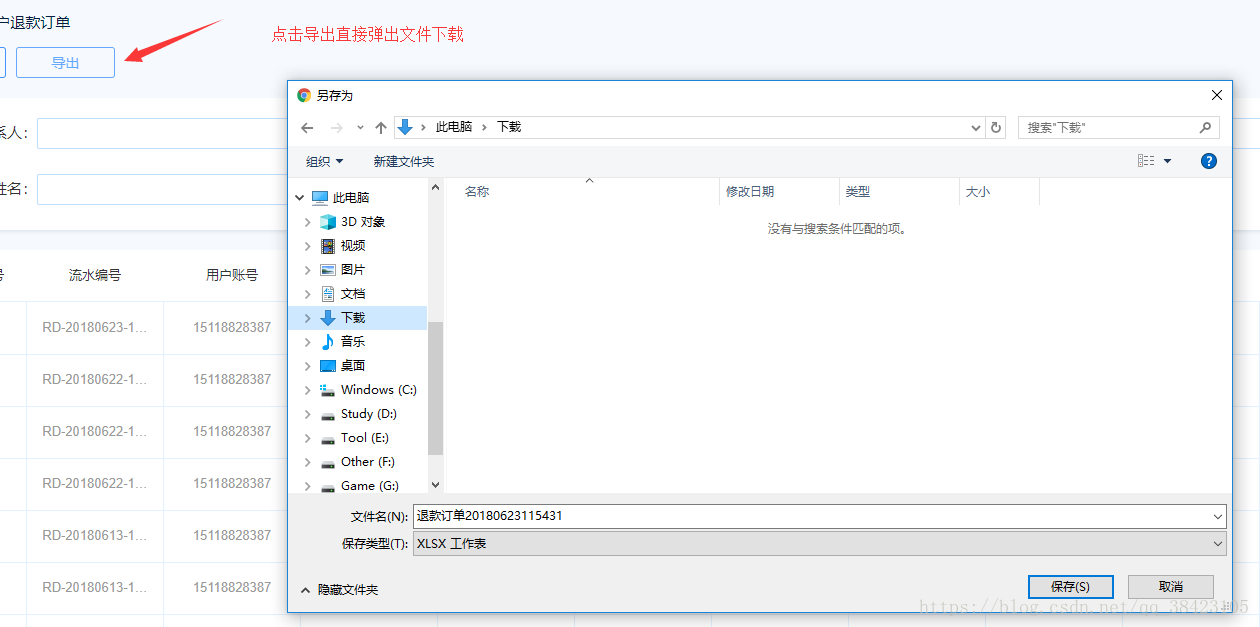转自:https://blog.csdn.net/qq_38423105/article/details/80782283
效果展示:


1.首先准备jar包
<dependency>
<groupId>org.apache.poi</groupId>
<artifactId>poi</artifactId>
<version>3.8</version>
</dependency>
2.前台页面访问 导出excel的接口
通过window.location.href来访问接口,直接弹出下载框
// 导出数据
$('#outExcel').click(function(){
var status = $('#status').val();
window.location.href = baseUrl + '/order/excel/orderrdExportExcel?status="+status;
});
3.后台通过获取response中的OutStream 流 ,将excel文件写到流里面,代码如下:
@GetMapping("/orderrdExportExcel")
public void grouppExportExcel(HttpServletRequest request,Orderrd orderrd,HttpServletResponse response) throws Exception{
List<Orderrd> grouppList = orderrdService.selectAllForLayUI(orderrd);
//导出文件的标题
String title = "退款订单"+DateUtil.getSimpleDate01(new Date())+".xlsx";
//设置表格标题行
String[] headers = new String[] {"序号","流水编号","用户账号","用户姓名","收款账号","账户余额","退款金额","手续费","申请时间"};
List<Object[]> dataList = new ArrayList<Object[]>();
Object[] objs = null;
for (int i = 0; i < grouppList.size(); i++) {
objs = new Object[headers.length];
objs[0] = 0;//设置序号,在工具类中会出现
objs[1] = grouppList.get(i).getOrderrdCode();
objs[2] = grouppList.get(i).getUsername();
objs[3] = grouppList.get(i).getUserName();
objs[4] = grouppList.get(i).getAccount();
objs[5] = grouppList.get(i).getPremain();
objs[6] = grouppList.get(i).getPricePre();
objs[7] = grouppList.get(i).getPricePay();
objs[8] = grouppList.get(i).getCreateTime();
dataList.add(objs);//数据添加到excel表格
}
//使用流将数据导出
OutputStream out = null;
try {
//防止中文乱码
String headStr = "attachment; filename="" + new String( title.getBytes("gb2312"), "ISO8859-1" ) + """;
response.setContentType("octets/stream");
response.setContentType("APPLICATION/OCTET-STREAM");
response.setHeader("Content-Disposition", headStr);
out = response.getOutputStream();
ExportExcelSeedBack ex = new ExportExcelSeedBack(title, headers, dataList);//没有标题
ex.export(out);
out.flush();
out.close();
} catch (Exception e) {
e.printStackTrace();
}
}
4.工具类如下:
import java.io.FileOutputStream;
import java.io.IOException;
import java.io.OutputStream;
import java.util.ArrayList;
import java.util.List;
import javax.servlet.http.HttpServletResponse;
import org.apache.poi.hssf.usermodel.HSSFCell;
import org.apache.poi.hssf.usermodel.HSSFCellStyle;
import org.apache.poi.hssf.usermodel.HSSFFont;
import org.apache.poi.hssf.usermodel.HSSFRichTextString;
import org.apache.poi.hssf.usermodel.HSSFRow;
import org.apache.poi.hssf.usermodel.HSSFSheet;
import org.apache.poi.hssf.usermodel.HSSFWorkbook;
import org.apache.poi.hssf.util.HSSFColor;
public class ExportExcelSeedBack {
//显示的导出表的标题
private String title;
//导出表的列名
private String[] rowName ;
private List<Object[]> dataList = new ArrayList<Object[]>();
HttpServletResponse response;
//构造方法,传入要导出的数据
public ExportExcelSeedBack(String title,String[] rowName,List<Object[]> dataList){
this.dataList = dataList;
this.rowName = rowName;
this.title = title;
}
/*
* 导出数据
* */
public void export(OutputStream out) throws Exception{
try{
HSSFWorkbook workbook = new HSSFWorkbook(); // 创建工作簿对象
HSSFSheet sheet = workbook.createSheet(title); // 创建工作表
// 产生表格标题行
// HSSFRow rowm = sheet.createRow(0);
// HSSFCell cellTiltle = rowm.createCell(0);
//sheet样式定义【getColumnTopStyle()/getStyle()均为自定义方法 - 在下面 - 可扩展】
HSSFCellStyle columnTopStyle = this.getColumnTopStyle(workbook);//获取列头样式对象
HSSFCellStyle style = this.getStyle(workbook); //单元格样式对象
// sheet.addMergedRegion(new CellRangeAddress(0, 1, 0, (rowName.length-1)));//合并单元格
// cellTiltle.setCellStyle(columnTopStyle);
// cellTiltle.setCellValue(title);
// 定义所需列数
int columnNum = rowName.length;
HSSFRow rowRowName = sheet.createRow(0); // 在索引2的位置创建行(最顶端的行开始的第二行)
// 将列头设置到sheet的单元格中
for(int n=0;n<columnNum;n++){
HSSFCell cellRowName = rowRowName.createCell(n); //创建列头对应个数的单元格
cellRowName.setCellType(HSSFCell.CELL_TYPE_STRING); //设置列头单元格的数据类型
HSSFRichTextString text = new HSSFRichTextString(rowName[n]);
cellRowName.setCellValue(text); //设置列头单元格的值
cellRowName.setCellStyle(columnTopStyle); //设置列头单元格样式
}
//将查询出的数据设置到sheet对应的单元格中
for(int i=0;i<dataList.size();i++){
Object[] obj = dataList.get(i);//遍历每个对象
HSSFRow row = sheet.createRow(i+1);//创建所需的行数(从第二行开始写数据)
for(int j=0; j<obj.length; j++){
HSSFCell cell = null; //设置单元格的数据类型
if(j == 0){
cell = row.createCell(j,HSSFCell.CELL_TYPE_NUMERIC);
cell.setCellValue(i+1);
}else{
cell = row.createCell(j,HSSFCell.CELL_TYPE_STRING);
if(!"".equals(obj[j]) && obj[j] != null){
cell.setCellValue(obj[j].toString()); //设置单元格的值
}
}
cell.setCellStyle(style); //设置单元格样式
}
}
//让列宽随着导出的列长自动适应
for (int colNum = 0; colNum < columnNum; colNum++) {
int columnWidth = sheet.getColumnWidth(colNum) / 256;
for (int rowNum = 0; rowNum < sheet.getLastRowNum(); rowNum++) {
HSSFRow currentRow;
//当前行未被使用过
if (sheet.getRow(rowNum) == null) {
currentRow = sheet.createRow(rowNum);
} else {
currentRow = sheet.getRow(rowNum);
}
// if (currentRow.getCell(colNum) != null) {
// HSSFCell currentCell = currentRow.getCell(colNum);
// if (currentCell.getCellType() == HSSFCell.CELL_TYPE_STRING) {
// int length = currentCell.getStringCellValue().getBytes().length;
// if (columnWidth < length) {
// columnWidth = length;
// }
// }
// }
if (currentRow.getCell(colNum) != null) {
HSSFCell currentCell = currentRow.getCell(colNum);
if (currentCell.getCellType() == HSSFCell.CELL_TYPE_STRING) {
int length = 0;
try {
length = currentCell.getStringCellValue().getBytes().length;
} catch (Exception e) {
//e.printStackTrace();
}
if (columnWidth < length) {
columnWidth = length;
}
}
}
}
if(colNum == 0){
sheet.setColumnWidth(colNum, (columnWidth-2) * 256);
}else{
sheet.setColumnWidth(colNum, (columnWidth+4) * 256);
}
}
if(workbook !=null){
try{
workbook.write(out);
}catch (IOException e) {
e.printStackTrace();
}
}
}catch(Exception e){
e.printStackTrace();
}
finally{
out.close();
}
}
/*
* 列头单元格样式
*/
public HSSFCellStyle getColumnTopStyle(HSSFWorkbook workbook) {
// 设置字体
HSSFFont font = workbook.createFont();
//设置字体大小
font.setFontHeightInPoints((short)11);
//字体加粗
font.setBoldweight(HSSFFont.BOLDWEIGHT_BOLD);
//设置字体名字
font.setFontName("Courier New");
//设置样式;
HSSFCellStyle style = workbook.createCellStyle();
//设置底边框;
style.setBorderBottom(HSSFCellStyle.BORDER_THIN);
//设置底边框颜色;
style.setBottomBorderColor(HSSFColor.BLACK.index);
//设置左边框;
style.setBorderLeft(HSSFCellStyle.BORDER_THIN);
//设置左边框颜色;
style.setLeftBorderColor(HSSFColor.BLACK.index);
//设置右边框;
style.setBorderRight(HSSFCellStyle.BORDER_THIN);
//设置右边框颜色;
style.setRightBorderColor(HSSFColor.BLACK.index);
//设置顶边框;
style.setBorderTop(HSSFCellStyle.BORDER_THIN);
//设置顶边框颜色;
style.setTopBorderColor(HSSFColor.BLACK.index);
//在样式用应用设置的字体;
style.setFont(font);
//设置自动换行;
style.setWrapText(false);
//设置水平对齐的样式为居中对齐;
style.setAlignment(HSSFCellStyle.ALIGN_CENTER);
//设置垂直对齐的样式为居中对齐;
style.setVerticalAlignment(HSSFCellStyle.VERTICAL_CENTER);
return style;
}
/*
* 列数据信息单元格样式
*/
public HSSFCellStyle getStyle(HSSFWorkbook workbook) {
// 设置字体
HSSFFont font = workbook.createFont();
//设置字体大小
//font.setFontHeightInPoints((short)10);
//字体加粗
//font.setBoldweight(HSSFFont.BOLDWEIGHT_BOLD);
//设置字体名字
font.setFontName("Courier New");
//设置样式;
HSSFCellStyle style = workbook.createCellStyle();
//设置底边框;
style.setBorderBottom(HSSFCellStyle.BORDER_THIN);
//设置底边框颜色;
style.setBottomBorderColor(HSSFColor.BLACK.index);
//设置左边框;
style.setBorderLeft(HSSFCellStyle.BORDER_THIN);
//设置左边框颜色;
style.setLeftBorderColor(HSSFColor.BLACK.index);
//设置右边框;
style.setBorderRight(HSSFCellStyle.BORDER_THIN);
//设置右边框颜色;
style.setRightBorderColor(HSSFColor.BLACK.index);
//设置顶边框;
style.setBorderTop(HSSFCellStyle.BORDER_THIN);
//设置顶边框颜色;
style.setTopBorderColor(HSSFColor.BLACK.index);
//在样式用应用设置的字体;
style.setFont(font);
//设置自动换行;
style.setWrapText(false);
//设置水平对齐的样式为居中对齐;
style.setAlignment(HSSFCellStyle.ALIGN_CENTER);
//设置垂直对齐的样式为居中对齐;
style.setVerticalAlignment(HSSFCellStyle.VERTICAL_CENTER);
return style;
}
}
————————————————
版权声明:本文为CSDN博主「wisdom-chen」的原创文章,遵循 CC 4.0 BY-SA 版权协议,转载请附上原文出处链接及本声明。
原文链接:https://blog.csdn.net/qq_38423105/article/details/80782283